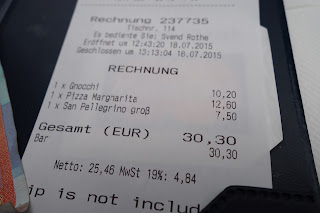Last week in Berlin, Elias and I shared a .75L bottle of bubbly for a whopping €7,50.
Of course, when water comes in bottles, your waitperson needs to unscrew the cap for you so you don't strain your genteel hands, and that comes with a price.
Yesterday, back in Bayern, Elias and I stopped in tiny-town Seefeld (OK, at Schloss Seefeld, the local tiny-town castle) for refreshment during a long walk, and we shared a .75L bottle of stilles (non-bubbly) Wasser for €6,50.
See that "Getraenke Divers" for €2,00? That miscellaneous beverage was a mug of cold milk--a drink so foreign to Germany that restaurants don't even have a receipt name for it. Hot milk is another thing. The milk yesterday was actually lukewarm, suggesting it was ultra-pasteurized long-shelf-life boxed milk. You'd think the effort of getting the milk out of the cow, pasteurizing the wazoo out of it, putting it in a box, and hiring someone to open the box and pour the milk into a mug would be more expensive than putting water in a bottle, forcing some carbon dioxide into it, and then getting someone to pour it into a fancy glass, but what do I, a gauche American tourist, know about such things?
In Germany, as in the U.S., ganz normales Leitungswasser ("totally normal [i.e. plain ol'] tap water") tastes quite fine and is available for cheap from most sinks. Why folks pay hundreds to thousands of times more money to get water from a bottle, I just don't understand.









